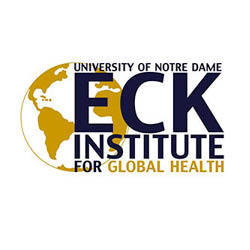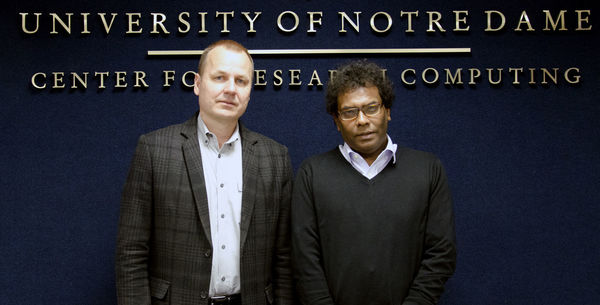

The University of Notre Dame’s Edwin Michael, professor of biological sciences and a member of the Eck Institute for Global Health, is part of a select group of individuals invited to form a new consortium to use mathematical modeling to project the spread and control of neglected tropical diseases (NTDs). The University of Warwick, UK, has been awarded an $8 million grant from the Bill and Melinda Gates Foundation to establish and support the work of the consortium. The new consortium will be the center of a global effort to reduce the burden of infectious diseases amongst the poorest billion in the world.
“We are excited that Prof. Michael has been chosen to participate in this international consortium,” states Robert Bernhard, vice president of research at the University of Notre Dame. “The work of the consortium has the potential to greatly improve our understanding of the propagation of diseases and their control. This is a very important research area for Notre Dame.”
The grant will focus on NTDs that thrive mainly among the poorest populations of the world. NTDs perpetuate the cycle of poverty and cause long-term suffering to millions. In recent years there has been a huge international investment in controlling the morbidity associated with these diseases and the World Health Organization has set ambitious targets for eliminating much of the disease burden by 2020.
Mathematical modeling plays an increasing role in public health planning and decision-making (such as determining cost-effectiveness of drugs and vaccines), but the use of such quantitative predictions has been sparse and sometimes contradictory for NTDs. With 2020 rapidly approaching, the treatment and control programs need epidemiological models to help evaluate the impact of current programs and potentially suggest optimal targeted designs for the future. Identifying regions where the controls could work more effectively and providing refinements to control strategies could have a major impact on achieving the World Health Organization’s 2020 targets.
Good quality modeling depends on good quality data and expert input through close collaboration with field epidemiologists, clinicians, country program managers, and international bodies. “Mathematical modeling primarily focuses on the development and implementation of novel analytical approaches for providing a deeper understanding of the determinants, pathways, and dynamics of disease transmission,” states Michael. “We use modeling data to gain insights for identifying and analyzing sustainable approaches to disease control. This is developing as the next frontier of disease control. I am pleased that my group, working jointly with the Center for Research Computing and supported by the Eck Institute for Global Health, will be a part of this global modeling effort to rid the burden of these persistent diseases that currently plague the development of some of the poorest nations of the world.”
Through a close relationship with the Task Force for Global Health in Atlanta, the researchers will be linked into a network of leading experts in this field. The innovative vision from the Gates Foundation was to commission not only modeling groups across a number of different diseases who will share their knowledge and methodologies but also for two modeling groups to work together on each of the diseases. These groups will develop separate modeling approaches, as well as work together to compare and contrast their results and hence provide consensus advice to policy makers. This will ensure that the advice given is based on the best quality science and has been robustly tested.
This international effort is being led by Professor Roy Anderson from the London Center for Neglected Tropical Diseases, Imperial College London, and Dr. Deirdre Hollingsworth from the School of Life Sciences and the Mathematics, Institute at the University of Warwick. Institutions are represented from elsewhere in the UK (Imperial College London, Liverpool School of Tropical Medicine, London School of Tropical Medicine), Europe (Erasmus Medical Centre), the USA (Case Western Reserve University, Johns Hopkins University, University of Notre Dame, Princeton University, University of California San Francisco, and Yale University) and Australia (Monash University). The gathering of this global team is a unique effort, brought together by the goal of improving the health of the poorest populations in the world.
The Eck Institute for Global Health recognizes health as a fundamental human right and endeavors to promote research, training, and service to advance health standards for all people, especially people in low-and middle-income countries, who are disproportionately impacted by preventable diseases.
The Center for Research Computing at University of Notre Dame is an innovative and multidisciplinary research environment that supports collaboration to facilitate discoveries in science and engineering, the arts, humanities and social sciences, through advanced computation, data analysis, and other digital research tools. The Center enhances the University’s cyber infrastructure, provides support for interdisciplinary research and education, and conducts computational research.
Contact: Sarah Craig at Craig.20@nd.edu or call 574-631-2665
Photo caption: L to R Jaroslaw Nabrzyski and Edwin Michael stand in front of Notre Dame’s Center for Research Computing to celebrate the great honor of Michael being recognized for his outstanding research achievements.
Originally published by at globalhealth.nd.edu on December 23, 2014.